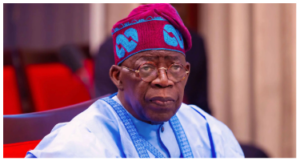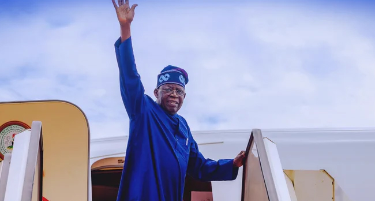President Bola Tinubu is set to depart Lagos on Tuesday for Pretoria, South Africa, where he will attend the inauguration of President Cyril Ramaphosa. This information was revealed in a statement issued on Monday by Ajuri Ngelale, the Special Adviser to President Buhari on Media and Publicity. The statement confirmed that President Tinubu will return to Nigeria shortly after the ceremony.
The inauguration ceremony is a significant event, marking the commencement of Ramaphosa’s second term as President of South Africa. Ramaphosa secured his re-election on Friday, following a challenging and highly competitive political environment. The re-election process saw Ramaphosa’s African National Congress (ANC), historically the dominant party since the end of apartheid, forced into an unprecedented coalition government.
Lawmakers in Cape Town voted decisively to reinstate Ramaphosa, aged 71, for another five-year term following the general elections held on May 29. These elections were notable as they did not produce an outright winner, a first in South Africa’s post-apartheid political landscape. Chief Justice Raymond Zondo declared, “I accordingly declare honourable M.C. Ramaphosa duly elected President,” after the votes were counted, solidifying Ramaphosa’s position for the next term.
This re-election comes at a critical juncture for South Africa. The ANC, the party that led the historic struggle against apartheid and brought Nelson Mandela to power, faced a significant reduction in its influence. For the first time in over three decades, the ANC failed to secure an absolute majority, garnering only 40 percent of the vote. This result forced the party to negotiate and form a coalition government, which it has termed a government of national unity.
 The May 29 election results are seen as a historic turning point for the nation, reflecting a shift in the political landscape and the electorate’s changing attitudes. The ANC’s loss of dominance in parliament indicates growing dissatisfaction among South Africans with the party’s leadership and governance. The coalition government now faces the challenge of addressing the country’s numerous socio-economic issues, including high unemployment rates, economic inequality, and systemic corruption.
The May 29 election results are seen as a historic turning point for the nation, reflecting a shift in the political landscape and the electorate’s changing attitudes. The ANC’s loss of dominance in parliament indicates growing dissatisfaction among South Africans with the party’s leadership and governance. The coalition government now faces the challenge of addressing the country’s numerous socio-economic issues, including high unemployment rates, economic inequality, and systemic corruption.
President Tinubu’s attendance at Ramaphosa’s inauguration underscores the importance of Nigeria-South Africa relations. As two of Africa’s largest economies, both countries play pivotal roles on the continent. Strengthening diplomatic ties and fostering cooperation between Nigeria and South Africa is crucial for regional stability and economic development.
President Tinubu’s visit also reflects the broader diplomatic and political engagements of Nigeria under his leadership. It provides an opportunity for bilateral discussions that could enhance cooperation in areas such as trade, security, and regional integration. Moreover, Tinubu’s presence at the inauguration signifies Nigeria’s support for South Africa’s democratic processes and political stability.
In summary, President Bola Tinubu’s forthcoming visit to South Africa for Cyril Ramaphosa’s inauguration is not merely a ceremonial duty but also a strategic diplomatic engagement. Ramaphosa’s re-election, achieved through a coalition government, marks a significant shift in South Africa’s political scene, ending the ANC’s long-standing dominance. This development presents both challenges and opportunities for South Africa’s future governance. As Nigeria and South Africa navigate these changes, their continued partnership will be vital for addressing common challenges and promoting prosperity across the African continent.




